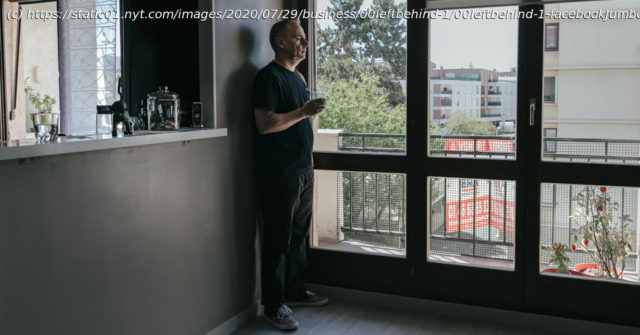Government efforts to subsidize wages and prevent layoffs have kept many in jobs, but they aren’t sheltering an army of precarious workers.
Thierry Hombert stepped onto the balcony of his sparsely furnished apartment and took one last long look around. When the coronavirus hit France, the short-term catering gigs on which he lived for a decade disappeared, and he was now selling his home to make ends meet. While millions of employees across Europe have been cast lifelines by government furlough programs meant to limit mass unemployment, Mr. Hombert and legions of other workers on precarious irregular contracts were excluded from that support. “It’s people like us who are falling through the cracks — and we are many,” said Mr. Hombert,50, who worried about finding himself out on the street. “We’re the ones being left behind.” The furlough programs, widely credited with sparing over 60 million people from layoffs in Europe, have a major drawback: They don’t shelter millions of workers who aren’t on company payrolls, including the newly self-employed, freelancers and people on the kind of short-term contracts that employers have used en masse since the 2010 financial crisis to reduce labor costs. These people generally have reduced access to unemployment benefits, which are far less generous than the furlough programs. Around 15 million people in the European Union were unemployed in June, a rise of 700,000 since April, according to Eurostat, Europe’s statistics agency. Heavily seeding those ranks are people who had been on work contracts. They account for around four out of 10 workers in the industries hardest hit by Covid-19, including tourism, catering, restaurants and services where there is direct contact with other people, according to the Organization for Economic Cooperation and Development. These workers face bleak prospects for new employment in Europe’s deep recession, and have fewer social protections than furloughed employees, including scant access to sick leave, exposing many to steep income losses and the threat of further precariousness. Mr. Hombert is among those who have taken a heavy hit. For 10 years, he forged a career in the catering industry by working on a relentless cycle of daily and hourly contracts. On a typical day, he woke at 5 a.m. to work a business breakfast at one end of Paris, then headed to another part of town to service a glittering political or social dinner ending after midnight. Grabbing a few hours of sleep, he headed to a fresh gig in the morning, where he signed new temporary contracts all over again. The work pulled in 3,000 euros ($3,500) a month — enough to pay living expenses, his €1,000 mortgage payment and support for his two teenage children.






